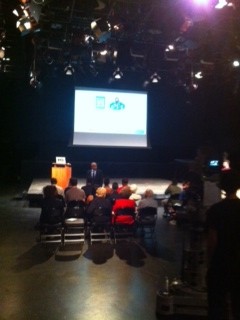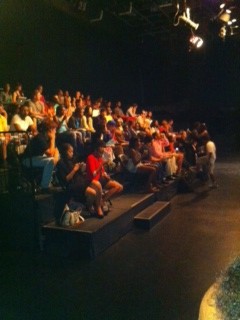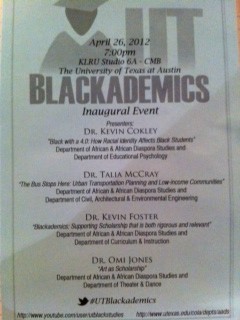

Last semester, I had the opportunity to join a steering committee to develop a new graduate-level “action research” course in UT’s African and African Diaspora Studies (AADS) Department. In our weekly meetings, several other graduate students from various departments, myself, and our fearless leader, Dr. Kevin Foster, would break down our vision for “Black Studies in the Age of New Media,” always with an emphasis on how we could utilize various social media platforms within the course as well as to achieve the course’s ultimate goals: dissemination of scholarly work from Black faculty at UT beyond the 40 Acres and establishing a new way to engage with the community, both locally and nationally.
All of the work the steering committee put in during last semester came to fruition this spring, with the course culminating in its inaugural event — UT Blackademics — on Thursday night.
The event, consisting of an assortment of brief presentations by UT faculty, was recorded in the KLRU studios on campus (the event will be aired on KLRU in a series of several episodes). Faculty hailed from several UT departments (all of which hold partial appointments in AADS), including Educational Psychology, Civil, Architectural & Environmental Engineering, Curriculum & Instruction, and Theater & Dance. In true social media fashion, the audience was encouraged to “live tweet” the event using the hashtag #UTBlackademics (check out my Twitter feed here!)
The presentations began with Dr. Kevin Cokley’s assessment of the impact that racial identity has on the academic achievement of Black students. Challenging the rationale that Black students “fear” being perceived as “acting white” — which he labeled a gross oversimplification — Dr. Cokley noted that gender and the degree to which an individual’s racial identity was central to their self-concept seemed to have a strong relationship with academic success in college.
Following Dr. Cokley was Dr. Talia McCray, who discussed urban transportation planning and the benefits of active forms of transportation, like walking or biking. Dr. McCray noted that there are gender differences in how spaces (bus stops in this case) are perceived as “safe” or “unsafe,” and that these perceptions then have an influence on behavior. Considering that most of the traveling that people do is within a 20 minute radius of their home, walking or biking would be more sustainable forms of transportation — but how, she asked, do we “nudge” people, especially people living in low-income areas, into participating?
Dr. Foster returned to the stage to discuss the relationship between teaching, research and service in academia. Though it is often encouraged that the focus should be on teaching and research, Dr. Foster argued that engagement with the community can actually make academics better teachers and researchers. As he emphasized through his example of his community outreach work through ICUSP, “We are all thinkers. We are all teachers. We are all learners.”
Lastly, but surely not least, Dr. Omi Jones, aka “Sista Docta,” danced onto the stage accompanied by drums, encouraging the audience to think about what embodiment tells us about blackness. Performing/lecturing on the difficulties for persons of color in academia and the challenges of dealing with students who don’t feel that black feminist thought is for them, she had the audience repeat this refrain of “verbal self-defense”: be careful, your misunderstandings are dangerous.
The entire evening had a great energy about it and I was extremely proud to have played a small part in this event’s existence. As Dr. Foster stated during the brief Q&A session, it is important for events like Blackademics to eventually become normal — presenting Black scholarship and making it accessible shouldn’t be uncommon. Overall, the night was a great success and I can’t wait for the next Blackademics event!
KLRU will be airing episodes at some point in the future. I’ll be sure to post that info when it becomes available!
—
Shantel G. Buggs is a “Sista Docta in Training” in the Department of Sociology. Her research interests include the lifecourse of multiracial individuals, interracial relationships and sexuality.
